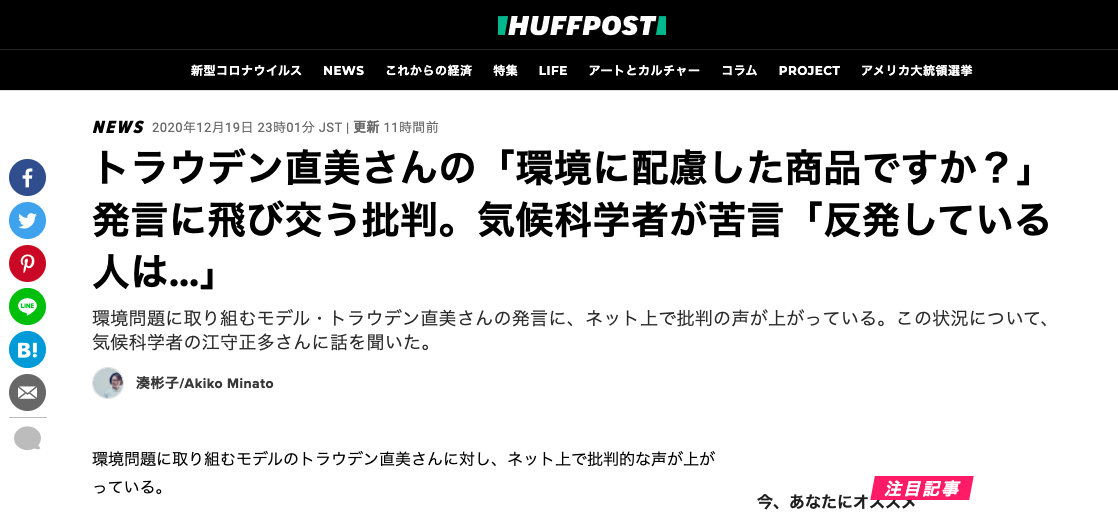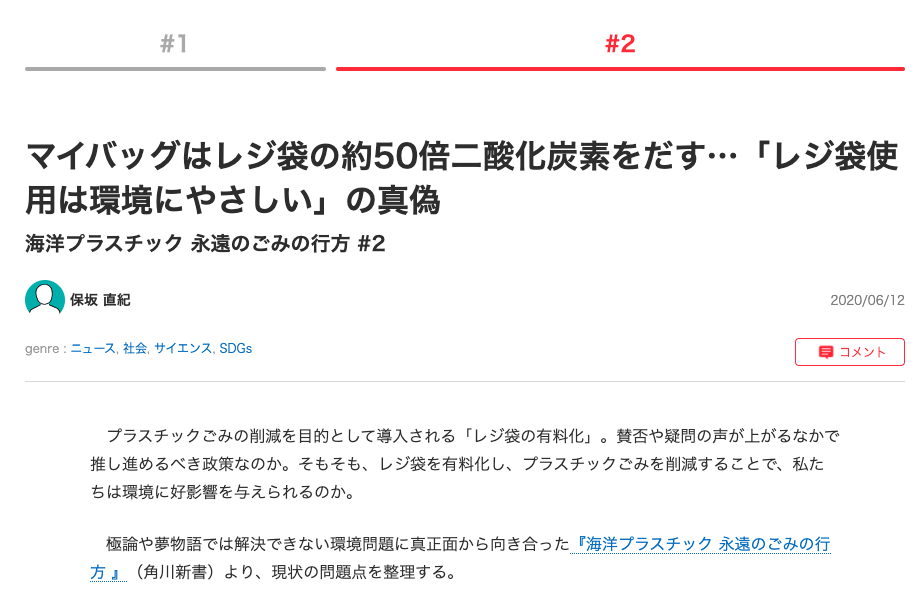- Published on
[System Thinking] Trauden Naomi's environmentally friendly comments are not enough to cause controversy.
Roughly speaking
- The store clerk of Trauden Naomi, who was in a big turmoil, made a troublesome environmentally friendly statement.
- In fact, there are major problems with carbon neutrality and carbon neutrality. Take plastic bags and EVs as examples.
- But there's some truth. Changing each individual's awareness creates an impact.
Trauden Naomi's environmentally friendly remarks
I want to talk about plastic bags for Christmas. It's quite a hassle.
The other day, Trauden Naomi's environmentally friendly statement, "When I go shopping, I ask the store clerk "Is it an environmentally friendly product?" and it also changes the store's awareness."
To be honest, it wasn't a very good statement that shot Shoku, but it wasn't worth criticizing it. The online buzz was a type of shortsighted criticism, with most criticisms saying that store clerks would be bothersome and naive.
The background to the criticism is the serious economic disparities, including those for the upper class. The grudge of low wages hit the cool national representative, Trauden Naomi. In fact, if you experience working part-time at a supermarket and be told, "Is this an environmentally friendly product?", you'll be irresistible.
But this is nothing more than a buying word for tips. If you calmly review your comments, there is some truth.
Is a carbon-free society possible?
It's impossible. Humans are originally made of carbon.
However, it is not completely decarbonized, so let's take a look at whether a society that is also called carbon neutral is possible. For easy-to-understand topics, we'll cover plastic bags and EVs.
Are plastic bags meaningful?
In conclusion, there is no point in terms of the total cost of carbon dioxide. My bags produce 50 times more carbon dioxide than plastic bags, and 3% of crude oil is used as plastic in the first place. It's pointless unless the number of people who use it as fuel for thermal power generation and other purposes is reduced.
In other words, it is completely pointless to use the Ministry of the Environment's charges for plastic bags, and it simply has the effect of raising awareness among the public. In fact, it is a cause of infection under the coronavirus. It could also be said to be merely harassment of the people. Trauden Naomi's comments were also nothing more than harassment at the moment.
So, should we reduce the fuel side? Let's take a look at the topics of EVs.
Are EVs good for the environment?
It is actually a mistake to say that EVs are environmentally friendly to gasoline vehicles. EVs consume more energy and are less efficient than gasoline vehicles. However, hybrid vehicles are actually more efficient than gasoline vehicles. To put it simply, hybrid vehicles are the best for the environment.
In the end, just like plastic bags, EV shifts are about raising awareness among end users. In fact, the reason Toyota's Prius became a hit in the US in the early 2000s was when a Hollywood star rode the Prius and used the environmentally friendly image to improve his own image, and the shift to EVs was, in the end, merely an environmental consideration as a pose.
Currently, the options for EVs, hybrids, gasoline and hydrogen remain in the automobile, but the main issues are as follows. In the first place, whether or not low-carbon emissions are a minor issue, but once it becomes an international theme, it cannot avoid trends towards EVs.
- Which of the following is lower carbon emissions?
- Convenience. What about the widespread use of stands and how long does it charge?
- What about safety, such as explosions in the event of an accident?
- Supply side issues. Batteries, gas tanks, desk lamps, gas stations, hydrogen stands. Is it enough for rare metal batteries? etc.
- Problems after use. How to dispose of batteries, how much does it cost to renovate an aging stand?
- Price issue. EVs have fewer parts than gasoline vehicles, making them cheaper to reduce costs (e.g. Citroen's 500,000 yen EV).
- The issue of competition. Europe and China have strong EVs. Germany has a bit of diesel. Japan is hybrid. America has EVs and gasoline.
- Employment issues. What will be the employment tree for the German and Japanese parts manufacturers?
- Player issues. At the Japan Federation of Industrial Industry, Toyota expressed concerns about EVs, as Mizuno Hiromichi, a former director of the world's largest investment fund GPIF (Independent Administrative Agency for Pension Reservation Investment), put pressure on the funds, saying, "From now on, we will not be able to invest in EVs and carbon neutrality." However, Mizuno is actually a director of Tesla. Isn't it a conflict of interest?
I'll avoid this as it will be a long explanation, but taking into account the above points, it's a hybrid than an EV. However, we cannot resist global trends, so if things continue like this, we will become a society of EVs. In economic terms, this is called a self-fulfilling prophecy.
In conclusion, a decarbonized society is impossible, but it is no longer logic, and various intentions make it impossible to avoid a transition to a decarbonized society. The world is manipulated by those who make rules.
When you think about system thinking, there is some truth
By the way, going back to Trauden Naomi's environmentally friendly remarks, from a micro perspective, it has a wonderful effect.
When each person conducts environmental awareness-raising activities, an awareness of environmental consideration will become popular throughout the world while drawing an S-shaped curve.
S-shaped growth
Take a look at For more information, please see a separate article on system thinking, "A collection of curve patterns that the world tends to conform to", but Trauden Naomi is making a statement suggesting this popularization curve. Boy Scouts' policy at camps is "better than they were when they came," and is widely used in Japan, but the slogans are in fact a catalyst for changing the behavior of micro-people.
Considering the realistic obstacles, it is undeniable that both Trauden Naomi and Koizumi Shinjiro are "flower-filled people" who look at the world on the basis of the good nature of humanity, but there is some truth to it, and I would like to say that they are not at all worthy of criticism.




